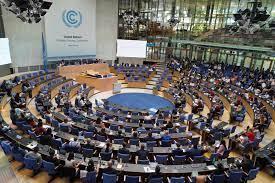
https://enb.iisd.org/bonn-climate-change-conference-sbi60-sbsta60
Parties will discuss lessons learned from the first Global Stocktake, progress on developing reporting tools under the Paris Agreement’s enhanced transparency framework, and support for developing countries to prepare their biennial transparency reports (which all parties are to submit in 2024).
While not every climate change conference is a big milestone event, it definitely was the case of the 28th meeting of the Conference of the Parties (COP) to the UN Framework Convention on Climate Change (UNFCCC), which convened in the United Arab Emirates in November 2023. In addition to the agreement establishing the institutional aspects of the loss and damage fund, it delivered a flurry of decisions with implications for the 60th sessions of the UNFCCC’s Subsidiary Bodies (SB 60) and follow-up meetings.
Crucially, COP 28 concluded the first Global Stocktake (GST) under the Paris Agreement, which, among others, calls on parties to transition away from fossil fuels in energy systems to achieve net zero by 2050. Other notable decisions pertain to the operationalization of the work programme on just transition pathways, the adoption of a framework for implementing the Global Goal on Adaptation (GGA), and the establishment of a new work programme on indicators for measuring progress towards the targets defined in the GGA framework.
At SB 60, parties will discuss progress in the development of the reporting tools under the Paris Agreement’s enhanced transparency framework as well as support for developing countries to prepare their biennial transparency reports, which all parties are to submit in 2024.
They will also discuss lessons learned from the first GST, with a view to refining the procedural and logistical elements of the GST process, and develop the modalities for a new dialogue aimed at supporting the implementation of GST outcomes. This is key to inform the development of the next round of nationally determined contributions (NDCs) that parties are to put forward in 2025.
Much of the negotiations will focus on review processes. Parties are expected to:
- develop the terms of reference (ToR) for the 2024 review of the Warsaw International Mechanism for Loss and Damage;
- initiate the development of the ToRs for the fifth comprehensive review of the implementation of the capacity-building framework under the Convention;
- initiate the second review of the Paris Committee on Capacity-building; and
- initiate the final review of the implementation of the enhanced Lima work programme on gender and its gender action plan.
Process related negotiations will address issues such as streamlining meeting agendas and increasing the participation of observer organizations from developing countries. Other agenda items relate to agriculture, gender, adaptation, linkages between the Technology Mechanism and the Financial Mechanism, research, and cooperative approaches for implementing the Paris Agreement (Article 6).
Bolivia proposed two additional agenda items:
- on developed countries’ immediate and urgent action to achieve net-zero emissions at the latest by 2030 and net-negative emissions thereafter; and
- on a road map on financial support and means of implementation for alternative policy approaches to results-based payments, such as joint mitigation and adaptation approaches for the integral and sustainable management of forests.
Whether parties will reach consensus on addressing these issues at SB 60 remains to be seen at the opening of the meeting.
A number of mandated events will also take place at SB 60, including:
- a dialogue on “cities, building, and urban systems” under the mitigation ambition and implementation work programme;
- a dialogue on just transition pathways to achieving the goals of the Paris Agreement through NDCs, national adaptation plans, and long-term low-emission development strategies;
- the annual ocean and climate change dialogue;
- an expert dialogue on mountains and climate change;
- a technical event on guidelines and policy frameworks to assist parties in promoting just transition of the workforce and the creation of decent work and quality jobs within and across sectors;
- a technical event on the positive and negative impacts associated with low- and zero-emission transport technologies;
- an expert dialogue on the disproportionate impacts of climate change on children and relevant policy solutions; and
- a session on the Secretariat’s policy and criteria for engagement and collaboration with non-party stakeholders.
SB 60 will convene from 3-13 June 2024, at the World Convention Center in Bonn, Germany. The Subsidiary Bodies meet twice a year, once in June and once in November/December alongside the COP. The Subsidiary Body for Scientific and Technological Advice (SBSTA) is the link between the scientific information provided by expert sources, such as the IPCC, and the policy-oriented needs of the governing bodies. The Subsidiary Body for Implementation (SBI) focuses on assessing and reviewing the implementation of the Convention, the Kyoto Protocol, and the Paris Agreement. The SBSTA and SBI work together on cross-cutting issues that touch on both their areas of expertise, which is the case for many issues.
The Earth Negotiations Bulletin writers for this meeting are Jennifer Bansard; Tomilola Akanle Eni-ibukun, Ph.D.; Christina Mundin; and Bernard Soubry, Ph.D. The Photographer is Kiara Worth, Ph.D. The Editor is Pamela Chasek, Ph.D.









